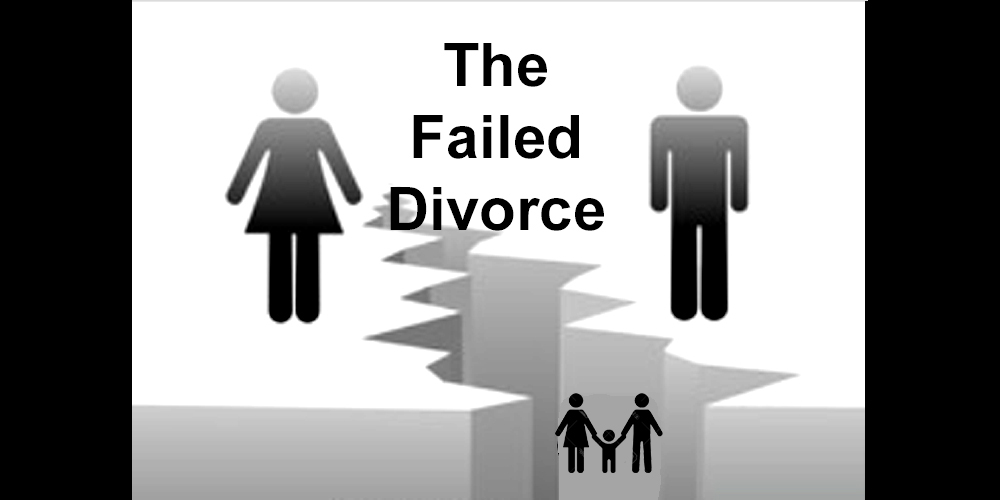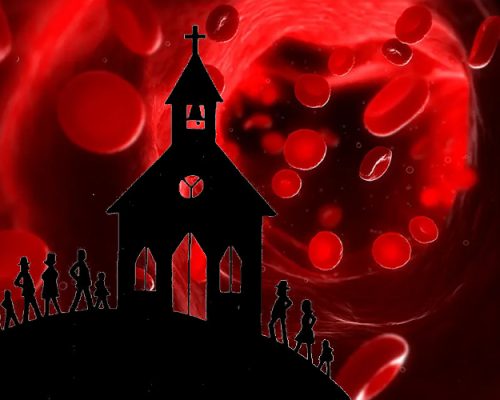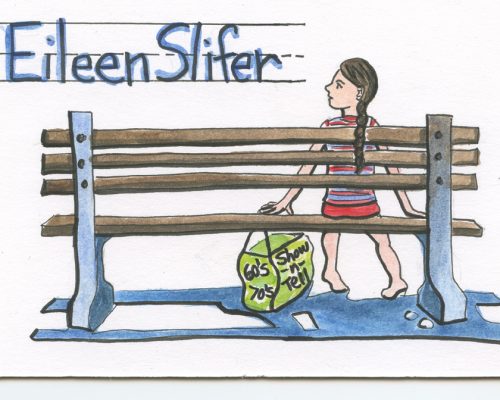“Divorce doesn’t fix anything. It just exchanges one set of problems for another.”
~ words of a dear friend spoken to me somewhere around the late 80’s or early 90’s
The term failed marriage is routine, these days.
But no one really speaks with any seeming clarity about the failed divorce beyond the immediate aftermath and point of bringing minor children to the legal age of adulthood.
I really don’t know of many – if any – specific materials or therapeutic promotion of continued co-parenting (co-navigating or co-honoring would be a more appropriate term, perhaps) past the arbitrary point the legal system ends such things as mandated child support. And with this legal end of the perceived window of required or appropriate “parenting,” also comes the end of any requirement that can hold one or both parents legally, morally, or ethically accountable for intentional (or unintentional) forms of ongoing damaging behaviors that continue to affect the young, adult children the couple bore together.
At the point of legal adulthood, continued co-navigation of the difficulties of grown children which arise, often times, from the unresolved aftermath of the damage that divorce inevitably inflicts, is purely voluntary. And not only is there no mandated communication which may be needed between the former spouses over valid concerns, modeling and to assure relational fairness arising from continued (or unresolved) issues still existing in the defunct nuclear family, but there are also inherent issues surrounding the sharing of holidays.
Even in families that are intact, the sharing of holidays (as grown children marry) is one that other women my age are navigating in terms of various forms of loss. The divorced nuclear family just adds new layers and often, new players (step-parents and others).
When children are under eighteen, the state mandates certain guidelines that exist between the divorced parents concerning such things. One would hope, in the ideal world, that these parents would continue to honor the spirit of such healthy instructions, but divorce itself exists in a realm that is not the ideal.
So why would we expect the age of legal adulthood to add some positive milestone in the situation?
If divorced parents of grown children do not find themselves in situations of continued impasse in terms of mutual positive regard, and more, I consider them quite fortunate. And I speculate that in these cases both parties move through life from a place of deep faith, integrity and moral fortitude.
Therefore in many real ways, the warzone of the post-divorce landscape is only beginning intensification of potentially life-long issues when the children enter the turbulent years of young adulthood. The seeded disparities in the dis-united parental front that existed in the marriage now has fertile ground to flourish in new and unfettered ways.
And, at this point, grown children also wield a tremendous amount of power with their newfound ability to enact forms of estrangement and punitive measures upon one or both parents. In our current societal trend toward the intentional, methodic, spiritually and politically-driven dis-mantling of the traditional family, which now even includes the dis-mantling of issues of basic facts (gender identity, the honoring of parents who are not inherently abusive, and much more) and with the prevalent climate of cancel culture and online echo chambers of peer influence by a large cohort of even more severely or equally divorce-damaged young adults, the propensity to wrongfully inflict a number of forms of anger and contempt onto a parent is honestly, quite horrifying.
I encounter many good, decent people and good parents (not perfect nor faultless parents) in my age bracket who are suffering in tremendous (and often hidden) ways at the receiving end of both the collective and individual fruits of the many seeds of contempt planted very early within a failed marriage now coming to full fruition.
It can be heart-breaking to listen to some of the feelings, fears and seemingly endless forms of self-questioning, self-punishment and even unraveling of hard-fought territory for healthy self-esteem and self-confidence.
So, what is a “failed divorce?” one might ask. Please stay with me on this and I hope that by the end, I can present a clearer picture of what I believe a failed divorce looks like.
First, it is my belief that a
failed marriage happens primarily due to the underlying interplay
of the following three factors:
- Factor One: The Seed is Not a Seed That Can Bear Lifelong Good Fruit We marry someone we should not have married. In secular terms, there are irreconcilable differences. In biblical terms, there is unequal yoking. Within the idea of equal yoking (even between intentional, professing Jesus followers) differences may be great. But probability of positive outcome (withstanding the inherent difficulties and challenges to beautiful, relational harmony in an inherently broken world) increases with the level of commitment each partner has to God and to His intended process of becoming one flesh with our beloved.
- Factor Two: The Seed Planted Begins to Develop This phase may happen rapidly or have a more insidious incubation and emergence.
- Factor Three: The Seed Planted Matures and Begins to Bear Fruit The first fruits that the marriage is on track toward failure is the communication of contempt. Contempt seems to be the initial harvest, in the biblical sense, predicting the nature of future fruit despite appearances that all the buds and ripening fruits are on track to be joyously harvested as sweet, healthy and nutrient-dense.
By the time we discern (sometimes we locate, in retrospect, the first sprouting of the seed of contempt) the clear, unambiguous emergence of the darker-side sprouts and fruits of the bad seed(s) of what we had hoped would be a beautiful, lifelong oak tree of enduring, loving partnership, it may be too late to re-cultivate and re-nurture whatever variables each partner might have contributed to the development of contempt toward their very best friend.
Many couples, from this place of brokenness, may contemplate a number of things as they navigate options in this impending war zone:
- Should we bear children within already shaky-ground of a marital covenant already giving clear glimpses that at least a few seeds of contempt have been planted?
- If children are already on the landscape, do we continue to navigate around forms of underlying contempt?
- Would the children involved ultimately be more healthy to opt for divorce – and at what point?
For the rest of you who are in mixed marriages—Christian married to non-Christian—we have no explicit command from the Master. So this is what you must do. If you are a man with a wife who is not a believer but who still wants to live with you, hold on to her. If you are a woman with a husband who is not a believer but he wants to live with you, hold on to him. The unbelieving husband shares to an extent in the holiness of his wife, and the unbelieving wife is likewise touched by the holiness of her husband. Otherwise, your children would be left out; as it is, they also are included in the spiritual purposes of God.
~I Corinthians 7:14
Becoming a Parent is Not Simply Biological, it is a Life-Long Calling
Here is where I believe the post-divorce landscape concerning grown children becomes extremely muddied and far south of Eden. Most any human male can father children or any human female give birth to that which is conceived in her, but becoming a true parent (either through natural birth or adoption) is a high calling.
When a marriage remains healthy and intact, the parental partners can guide one another through the difficulties that arise as children come into young adulthood, and beyond. They can help one another to know when to speak and when to be silent and more importantly, they provide one another a loving, comforting and reciprocating presence as the basis for their mutually-needful transitions and letting go of expectations and control of outcomes are shared together.
Two certainly are better than one (Ecclesiastes 4:12), as they co-navigate and watch, together, the cycle of life which inevitably involves both successes and pitfalls, as fledgling humans gradually leave the nest.
And in the ideal, and traditional system, the family home (or homestead) was a place of safety.
The parental home is a nest to which the adult birds keep wanting to return in relational shalom.
It is a safe-landing and place of connection between past, present and future. Surely even one-hundred years ago there were forms of parental estrangement (or in the NT the age-old story of the prodigal son) and the aging couple would help one another find ways to leave the porch light on, so-to-speak, in hopes that in time, the good seeds they planted, together, in their offspring, would come to holy, sacred and rightful fruition.
In the intact family unit, the couple reap, together, both the good fruits and the bad fruits of that which they gave of themselves, together as one (or, as dis-united even in the marriage) to their grown children over the years. In the defunct family unit, these fruits are inherently divided up in ways that sometimes do not seem fair, right or in proportion to whatever existed during the times prior to the divisive, severing action of divorce.
But today, it seems even the very concept of the place of lifelong spiritual and familial connections is called into question, and its validity twisted and diluted down – swallowed up in the post-modern views that remove the traditionally-understood meanings of not only words such as love, gratitude, honor and respect but render once-rich words devoid of any real meaning.
I’ll never forget hearing about an exchange between a mother and a grown son who within almost-touching-sentences – whether within one single conversation or days apart I don’t recall – language was employed around their self-perception of deepening “gratitude” conjoined with language calling their own mother a “selfish b*tch” directly to her face. It was quite a shocking and heart-breaking story that my friend relayed to me.
I’ve also heard stories of grown sons using direct and cutting forms of profanity toward their mother with a tone of contempt in their voice. When I hear of these things, I am saddened to imagine both the genesis of such capacities and the impact beyond the dis-honoring of their own mother. Historically, young women are cautioned against involvement with men who mis-treat their mother, and for good reason.
Despite what our society seeks to dis-mantle, there is truth that a man who mis-treats his own mother (and this is often a learned behavior and fruit of role modeling) will likely treat their wife in the same manor. The seeds of woman-hating and misogyny are unnatural, and not what God intends.
To understand the lifelong roles between divorced parents we must first understand that divorce itself is outside of the will of God. It exists in the permitted will of God and many times, is permitted with good and valid reason.
And this is where many of us find ourselves still reeling with various aftermath of a divorce that may have occurred ten, twenty, thirty or more years back.
According to the seed metaphor, we still find ourselves needing to cut away bruised fruits, spit out rancid bites and look into the many faces of the spoils of the marital family war.
The root (issues of the entire defunct family system) has continued to spread, grow, mature and manifest that which brought the marital covenant to some ending.
And we sit, sorting through the difficult fruits and the compounding fact, that for various reasons, even the divorce didn’t “succeed.”
It was inherently, a failed divorce.
Yes, the divorce failed to salvage and re-set the trajectory of the seeds of contempt long-ago planted not only toward one’s lifelong partner and best friend, but vicariously sown into the minds and hearts of their offspring.
If the divorce itself had its genesis in contempt (which seems to be the biggest predictor of divorce), there is a real probability that forms of contempt have already polluted the minds, hearts and emotions of their offspring from a very young age.
To undo this inherent harm seems, at times, beyond any reasonable hope.
The pathways of contempt are so deep, so entrenched and taught over the years, often in covert, vicarious and other ways (that so easily fly under the radar to the observer who lacks historic reference points).
Really, most broken situations cannot be truly mended or addressed due to the insidious nature of the reference points and milestones. Any attempt to unravel such things in hope of positive changes is only heard as circuitous and likely involves toxic amounts and forms of deception and passive-aggression – colliding in the same old divergent narratives.
Years and even decades later, manifestations of ungodly, destructive and damaging new united fronts have now stepped into the vacuum of the dis-united parental front that existed within the marriage and perhaps even contributed to one or both partners choosing to sever the marital covenant.
Don’t become partners with those who reject God. How can you make a partnership out of right and wrong? That’s not partnership; that’s war. Is light best friends with dark? Does Christ go strolling with the Devil? Do trust and mistrust hold hands? Who would think of setting up pagan idols in God’s holy Temple? But that is exactly what we are, each of us a temple in whom God lives. God himself put it this way:
~ 2 Corinthians 6:14-18
“I’ll live in them, move into them;
I’ll be their God and they’ll be my people.
So leave the corruption and compromise;
leave it for good,” says God.
“Don’t link up with those who will pollute you.
I want you all for myself.
I’ll be a Father to you;
you’ll be sons and daughters to me.”
The Word of the Master, God.
In essence, the central message of this expression is that a failed divorce is simply a severance that was either too late or otherwise unable to halt the germination, continued rooting, expansion and ultimate fruiting of the seeds of contempt, with particular acknowledgement of the seemingly-immutable dysfunctional family system still existing in the post-divorce landscape.
I think on the beautiful expression Kisses Sweeter Than Wine which essentially describes the successful marriage where both partners, together, reap the rightful fruits of their inevitable troubles and pains of former years that all marriages and family systems encounter.
In the upside-down landscape of the failed divorce, where one would hope that fruits should be somehow redeemed and reaped by each former spouse proportionally and in accordance with their works, we find instead, the locusts continuing to devour and re-distribute the various “spoils” of the post-marital warzone…
Kisses Sweeter Than Wine
~Writer(s): Pete Seeger, Lee Hays, Fred Hellerman, Ronnie Gilbert, Joel Newman
When I was a young man and never been kissed
I got to thinking it over what I had missed.
I got me a girl, I kissed her and then
Oh Lord, I kissed her again.
Oh, kisses sweeter than wine,
Oh, kisses sweeter than wine
I asked her to marry and be my sweet wife,
And we would be so happy the rest of our lives.
I begged and I pleaded like a natural man,
And then, Oh Lord, she gave me her hand.
Oh, kisses sweeter than wine,
Oh, kisses sweeter than wine
I worked mighty hard and so did my wife,
Workin’ hand in hand to make a good life.
With corn in the field and wheat in the bins,
I was, Oh Lord, the father of twins.
Oh, kisses sweeter than wine,
Oh, kisses sweeter than wine
Our children they numbered just about four,
They all had sweethearts knockin’ at the door.
They all got married and they didn’t hesitate;
I was, Oh Lord, the grandmother of eight.
Oh, kisses sweeter than wine,
Oh, kisses sweeter than wine
Now that we’re old, and ready to go,
We get to thinkin’ what happened a long time ago.
We had a lot of kids, trouble and pain,
But, Oh Lord, We’d do it again.
Oh, kisses sweeter than wine,
Oh, kisses sweeter than wine
__________
1What is Narcissistic Parental Alienation Syndrome?
2Douglas Todd: When children are taught to hate one parent, what can be done?
Thank You For Reading
Please Feel Free To Express Your Thoughts Below




